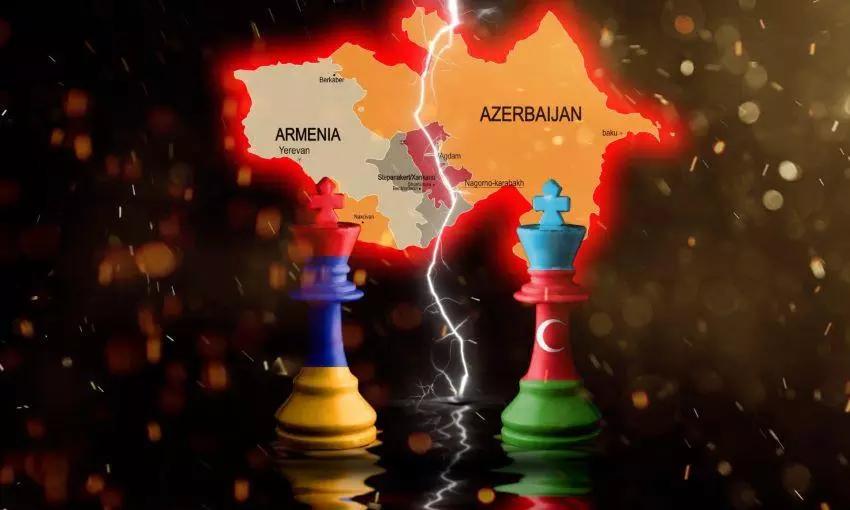
Foreign policy dynamics of Armenia and Azerbaijan: A historical and geopolitical analysis
text_fieldsThe Nagorno-Karabakh conflict is a complex web of historical details, ethnic conflicts, and strategic manoeuvres in the geopolitical chess game of the South Caucasus. This struggle began in the Soviet Union's intricate tapestry in 1923 and has lasted for decades, interspersed with wars and ceasefires. The Second Nagorno-Karabakh War of 2020 is the most recent chapter, which not only redrew the borders but also highlighted the complexities of regional power dynamics.
The conflict between Nagorno-Karabakh and other unresolved geopolitical mysteries has its origins in the chaotic Soviet era and has continued to be fought despite periodic ceasefires. Like the apparently intractable nature of territorial disputes, durable solutions continue to elude us even after decades of negotiation spearheaded by the Minsk Group.
By looking at the historical causes of the most recent war, the difficulties in achieving a settlement, and the geopolitical ramifications, this opinion piece seeks to shed light on the ongoing struggle. While negotiating the complex terrain of Nagorno-Karabakh, we encounter a geopolitical dilemma with broad ramifications in addition to a territorial conflict. The recent escalation of war in the historically contested area of Nagorno-Karabakh, which is home to both Azerbaijan and Armenia, can be traced back to the aftermath of the disintegration of the Soviet Union. A protracted war in the early 1990s ended in a ceasefire in 1994, which gave Armenia control over Nagorno-Karabakh and a sizable chunk of Azerbaijani territory.
The 2020 confrontation is set against a background of significant military investment by Azerbaijan, propelled by oil and gas earnings, which led to a noteworthy rise in the country's yearly defence budget between 2006 and 2015. The strategic partnership between Azerbaijan and Turkey, characterized by strong military, intelligence, and political backing, was crucial in determining how the conflict developed.
Azerbaijan's position during the 2020 conflict was further strengthened by the influx of Syrian mercenaries backed by Turkey. Interestingly, Azerbaijan made a deliberate investment in Israeli Unmanned Aerial Systems (UASs), amassing a varied arsenal of hovering munitions and several types of Israeli UASs. The fact that Azerbaijan acquired Turkey's armed unmanned aerial system (Bayraktar TB2) was particularly noteworthy, as it signaled a radical change in the technology environment surrounding the conflict. Although these systems were held by Azerbaijan, reports suggest that Turkish aircraft and crews used them during the 2020 conflict.
This disparity in technology proved to be critical, as Azerbaijan's highly developed UAS fleet was able to overwhelm Armenia's air defenses, which were primarily Cold War-era installations. Armenia's difficulties were exacerbated by the absence of an integrated air defense system and short-range capability shortcomings, which gave Azerbaijan the advantage to declare early wins and maintain widespread air superiority throughout the fight.
By establishing its first foreign presence along the Armenian side of the border with Azerbaijan since the conflict's inception in 1988, the European Union (EU) showed leadership in this regard. The deployment of up to forty experts has been authorized by the EU Council with the intention of fostering trust and assisting the conflict settlement process through observation, analysis, and reporting on the circumstances.
The mission, which started on October 20, 2022, and is expected to run for a maximum of two months, shows how committed the EU is to resolving the unstable situation and promoting stability in the region. The EU's prompt reaction to Armenia's intervention request contrasts with the CSTO, which is led by Russia, and is seen as taking a passive approach. Armenia approached the EU, expressing dissatisfaction with the CSTO's stance and highlighting the necessity of a strong international presence to stop future escalation.
The European Union moved quickly despite its convoluted bureaucracy, sending specialists from the European Union Monitoring Mission in Georgia to evaluate possible roles and authorities. As a deterrent following the most recent fatal war, Armenia turned to the EU mission near its border with Azerbaijan. The mission's goal is to promote stability and productive negotiations. Experts, such as Boris Navasardyan of the Yerevan Press Club, are hopeful that the EU's presence will stop more events and have a beneficial impact on communications, peace negotiations, and border delimitation.
After some hesitation, Azerbaijan finally agreed to the EU mission after realizing that it was taking place on Armenian territory. According to Zaur Shiriyev of the International Crisis Group, the purposeful ambiguity of the deal highlights the complicated diplomatic dynamics in the area and adds complexity.
Russia, which has always served as a mediator, disagrees with the EU's involvement and sees it as an attempt to take the lead. Moscow's discontent contrasts with the EU's proactive involvement, indicating a change in global involvement that puts regional powers in jeopardy. In place of the EU mission, Russian Foreign Minister Sergey Lavrov suggested CSTO monitors.
Armenia, though, is still awaiting a definitive political judgment from its CSTO allies. The divergent reactions within the EU and the CSTO highlight the South Caucasus's growing complexity. The active involvement of the EU is a reflection of a paradigm shift, as conventional power dynamics are being challenged by increased international involvement.
The EU's involvement could be crucial in influencing negotiations and promoting calm in the tense area as things develop. The UN intervened in the 1992 Azerbaijan-Karabakh conflict, sending fact-finding missions to support CSCE mediation. Despite claims of chemical weapons use, no evidence was found. The UN Security Council adopted resolutions in 1993, but Azerbaijan's compliance has been limited.
Following the truce, Azerbaijan has repeatedly violated the agreement, rejected suggested steps for reinforcement, and obstructed peaceful resolutions. Non-compliance is further highlighted by the blockading of the territory, the inability to hold direct negotiations with Nagorno-Karabakh, and the obstruction of humanitarian aid attempts.
UN resolutions demanding compliance have become essentially meaningless due to Azerbaijan's continual threats of new hostilities and predilection for a military solution. Because of Azerbaijan's actions, the UN's efforts to mediate a peaceful settlement continue to be hindered and the road to regional stability is made more difficult. Armenia has a strong alliance with Russia, focusing on military and economic cooperation within the CSTO and EEU. It also joins the EU, influencing its EU relations. Armenia prioritizes cultural ties and advocacy efforts.
Azerbaijan, a major energy player, has a strategic alliance with Turkey and engages in regional organizations like the OSCE and the Non-Aligned Movement.
In conclusion, regional complexity, Armenia's strategic partnership with Russia, and a nuanced engagement with its diaspora are all closely related to the country's foreign policy. Azerbaijan's geopolitical stance, on the other hand, is shaped by its alliance with Turkey, emphasis on energy diplomacy, and dedication to settling the Nagorno-Karabakh conflict. The South Caucasus offers a multifaceted picture of past tensions and ongoing hostilities, highlighting the delicate relationship between alliances and unresolved geopolitical narratives in Armenia's and Azerbaijan's foreign policies.
Amnah Z Panakkat is a final-year student of Journalism & International Peace Studies at St. Joseph's University, Bangalore.























